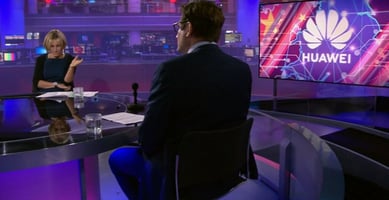You could be forgiven for thinking the answer to this question is relatively straightforward.
There were some fascinating comments from a journalist after a high-profile interview at the weekend.
Sophy Ridge, a Sky News presenter, complained about the number of interviewees who offered ‘boring sound bites and meaningless statements’.
She said: “The most frustrating thing for a political interviewer is when guests simply shut down your carefully crafted questions with boring sound bites and meaningless statements.
“Sadly, some politicians aim to get through an interview without giving any news lines. Needless to say, that doesn’t make either interesting or informative television.”
Ms Ridge made these comments after interviewing former Prime Minister Tony Blair, who she described as ‘refreshing’.
She added: “Tony Blair is a refreshing person to interview because he engages with whatever questions you ask without trying to bat them away.”
Her argument appears to be that too many of the people she interviews are scared of saying the wrong thing.
If you’re a high-profile politician you may well get away with a bland interview where you say very little.
But a corporate spokesperson is likely to be less fortunate.
Journalists need interesting spokespeople, so those who are bland and say nothing of any real interest are unlikely to be asked to come back again.
So if your spokespeople are so fearful of media interview mistakes that they are missing the opportunities they present, what can they do about it?
Approach
One of the key lessons here is how you approach the interview.
The fear of saying something you shouldn’t is perfectly understandable. But if your main aim when talking to a reporter is to simply avoid saying the wrong thing, then you will come across as evasive, defensive and dull.
A much better approach is to have a positive, more ambitious aim. Think of a headline you would like to create from your interview or the one message you would want the audience to take away.
Even when dealing with a negative story or a crisis media management incident there will be a message you want to get across.
Journalists
It’s understandable to feel nervous about talking to a journalist.
But it is important to remember that most spokespeople are not going to find themselves on the receiving end of a Jeremy Paxman style inquisition. Even John Humphrys, another reporter with a fierce reputation, is retiring.
Sure, they will still face challenging questions, but most reporters will not deliberately set out to trip someone up.
They are looking for people who can add something meaningful to a story so that they can fill their airtime and find the quotes they need.
Those spokespeople who do this well are likely to be asked back again in future – success breeds success.
Another fear spokespeople sometimes have is that what they say might be ‘taken out of context’. But the reality is that this happens very rarely.
It’s also worth remembering here that the spokesperson is the expert – they will invariably know more about the subject than the journalist.
Understand
It’s crucial to understand why you are being interviewed. Is it because your organisation is at the centre of a story or is it being asked to contribute to a wider topic?
These are different scenarios. If your organisation is at the centre of a story because something has gone badly wrong or because of job losses, then the line of questioning is likely to be tougher.
But often organisations and their spokespeople are interviewed to contribute to a bigger, or more general, conversation.
A health charity, for example, could be asked to give its thoughts on proposals to cut down prescriptions. A university’s science department could be asked to contribute to a discussion on the latest environmental research.
In these scenarios, it is a lot less likely that that the spokesperson is going to face an aggressive or tough line of questioning.
Mistakes will happen
One of the best ways to overcome the fear of making mistakes in an interview is to realise that many spokespeople make them.
They happen regularly, but rarely are they damaging, or even particularly memorable.
They have to be a real foot in the mouth moment – generally on an issue that has already created a lot of negativity - for that to happen. Think of the Persimmon Homes boss walking out of an interview when he faced questions about his bonus.
For the vast majority of media spokespeople, a mistake in an interview will not be career limiting.
Anticipate
Instead of worrying about difficult questions which might be asked, spokespeople should anticipate them and work out how they would respond.
Similarly, they should think about the wider issues – perhaps something else which is happening in the industry – which might be brought into the conversation.
The more of these questions they anticipate, the less likely they are to face a question in the interview they don’t know how to answer.
Human interest
We talk a lot on our media training courses about the importance of spokespeople including human interest content in their interviews.
Journalists and their audiences love the human interest angle and it can create an emotional connection.
But the other, possibly less well-known benefit, is that adding human examples to interviews can help spokespeople to find their feet and establish some control over its direction.
Preparation
Preparation is absolutely crucial for media interviews.
But, there is a danger of over-preparation, particularly when it comes to swatting up on huge briefing documents.
This can lead to spokespeople becoming more nervous as they build the interview up in their minds.
It can also make them appear scripted and audiences do not like spokespeople who sound like they have memorised a series of approved lines or are reading a press release aloud. This, to use Ms Ridge’s choice of words, creates ‘boring sound bites’.
Media training
The best way to avoid ‘boring sound bites and meaningless statements’ is through media training with current working journalist tutors.
Our tutors will put spokespeople through their paces in broadcast and print interviews so that they are well-prepared for the real thing and have nothing the fear.
Tony Blair may be a divisive political figure, but it seems there is plenty media spokespeople can learn from him.
Media First are media and communications training specialists with over 30 years of experience. We have a team of trainers, each with decades of experience working as journalists, presenters, communications coaches and media trainers.




